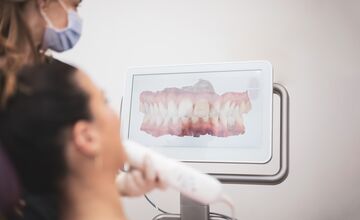
Periodontics in Warwick
Benefits of periodontics
-
State of the art practice
-
Local independent practice
-
Highly experienced clinicians
-
Taking on new patients
Periodontum is the name given to the structures of hard and soft tissue that support your teeth in your jaw. It includes the socket, gums, root cementum and periodontal ligaments. Caring for these structures will safeguard your oral health.
Periodontists offer specialist knowledge of these structures. They can spot the early signs of periodontal disease and take steps to prevent further issues with treatment and preventative measures. The role of the periodontist is to protect the structures that keep your teeth in place, which can improve your oral health in the long term.
Why do you need this treatment?
You may be referred to a periodontist following a routine checkup. It's important to take periodontal treatment seriously, as the consequences for avoiding treatment can be serious. Left untreated, periodontal disease can lead to tooth loss and bone loss.
You might need to seek specialist treatment if you notice any of the following symptoms of gum disease:
- Bleeding when you brush your teeth
- Teeth that look or feel like they are moving
- Red or swollen gums
- Bad breath that won't go away with brushing
- Teeth looking longer, as your gums are receding
- Larger gaps between your teeth
- Frequent gum infections
What happens during treatment?
The treatment you require will all depend on the severity of your condition. It could include nonsurgical and surgical options. Examples of nonsurgical interventions include antibiotics to treat infections and hygienist cleanings to remove plaque and tartar.
Surgical options include flap surgery, to remove infection and plaque from your tooth roots. You might also require dental bone grafts to increase bone density. Treatment could also include gum grafts to replace the lost tissue around your teeth.
The best preventative option for avoiding periodontal disease is regular dental hygienist cleanings. This will help you to avoid infections in your gums which can spread to the root and bone.

Related treatments
Periodontics and dental implants
Periodontal disease is one of the main reasons that dental implants can fail. Just as infections can spread to your tooth root and cause the tooth to come loose, infection can also spread to dental implants and cause them to come loose.
Before we start treatment for dental implants, we will need to make sure that any signs of gum disease are under control. We would then recommend committing to regular hygienist cleanings after you have had your implants placed to help protect your gums and supporting structures.


Meet
our team
Get to know the team behind the treatments. We are proud to have built a team of experts and industry leaders. Meet the dental surgeons, dentists, dental nurses and support staff that will help support you on your journey to better oral health.
About the team
What to expect from your treatment journey
We want you to feel empowered and informed every step of the way. Understand what to expect during your treatment with this simple guide. Your exact treatment plan might change, but this will be explained during your consultation.

If you are concerned about gum disease or loose teeth, book a consultation with our team. You can book a routine checkup and we will refer you to our periodontal team if required.
We offer a wide range of preventative and restorative treatments to help you address your periodontal issues. We'll guide you through the options so that you can make an informed decision.
Once you have your periodontal disease under control, we can provide ongoing support to help minimise the risk that your dental problems might return.

Frequently Asked Questions
It’s common to have lots of questions about your treatment. We’ve answered some of the most popular questions below.
It's important to treat active periodontal disease to limit the damage to your teeth and gums. With quick intervention, you should be able to address the underlying cause of your gum disease and keep this under control throughout your life.
Tooth loss is certainly possible if gum disease and periodontal disease are left untreated. As the infection spreads to the bone, this can result in bone loss, which will allow you teeth to become loose and fall out.
Your dentist will refer you to a periodontist if they suspect that you have issues with your gums, including gum disease, receding gums or bone loss. Your dental hygienist may also recommend booking a follow-up appointment with your dentist if they spot the early signs of gum disease.



